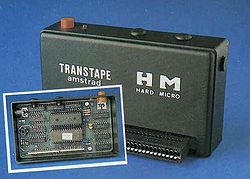Technical
- Uses a 16KB ROM paged into memory at &0000.
- Uses a 8KB static RAM paged into memory at &c000.
- ROM is paged into the range &0000-&3fff when the red button is pressed and the NMI vector is executed.
- When the black button is pressed, the ROM is paged into the range &0000-&3fff and executes it at &0000.
This checks the BASIC ROM version, and clears the extra ram if a BASIC ROM from a CPC6128 is found.
Code:
0000 f3 di ;; disable maskable interrupts 0001 0100df ld bc,0df00h ;; select upper rom 0 0004 ed49 out (c),c 0006 01817f ld bc,7f81h ;; enable upper rom (mode 1 too) 0009 ed49 out (c),c 000b 31febf ld sp,0bffeh ;; setup stack which is not initialised after reset 000e 3a02c0 ld a,(0c002h) ;; read BASIC ROM version number 0011 fe02 cp 02h ;; CPC6128? 0013 cc2e0c call z,0c2eh ;; erase extra RAM ;; this appears to set it up for a reset.. 0016 210000 ld hl,0000h 0019 e5 push hl 001a e5 push hl 001b c30038 jp 3800h ;; I think the hardware monitors for address 3800h and if found disables the ROM
- Uses NMI
- Doesn't appear to capture the hardware state like the Multiface does. Code in the ROM reads the PPI state, AY registers, and CRTC registers 12,13,14 and 15 and stores there values and restores them later.
- When a write happens to their RAM it appears to write through to the RAM behind??
- Menu code is at offset &3810 and is copied into RAM at &A200.
- Uses port FBF0 (output), FBFF (input). Don't know the exact functions yet.
writing 0 to fbf0 disables it's internal rom.
- The same plastic case is used by the Spectrum version of this interface.
The spectrum has two switches on the top. One of which chooses load/save. In the Amstrad these holes are filled with plastic caps.
Pictures
- Transtape
- Transtape Layout, thanks to Jose Leandro
Manual
- Transtape Manual (pdf) (spanish)
Downloads
- Transtape Rom dump (zipped rom file)
- Transtape-ROM.zip (Transtape ROM)
- Transtape (eagle).zip (Transtape files for Eagle)







